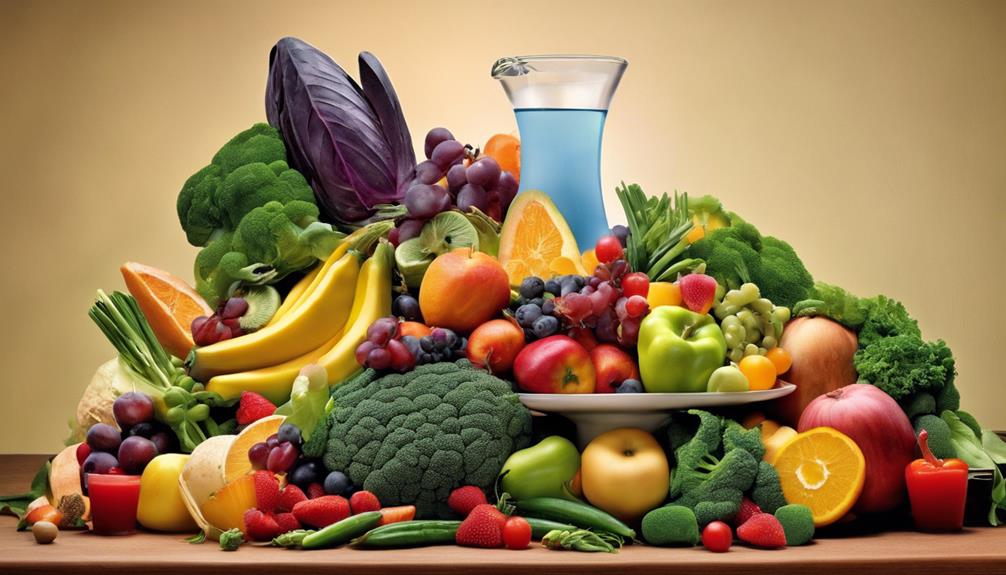Thinking about the benefits of incorporating Brewer’s Yeast into your breastfeeding routine, it is common to wonder about the credibility of its highly praised advantages.
While some swear by its ability to bolster milk production, others approach with skepticism.
Let's explore the science behind this age-old remedy and unravel the mysteries surrounding its efficacy for lactating individuals.
Key Takeaways
- Brewers yeast supports lactation and energy levels in breastfeeding mothers.
- Consult a healthcare provider before usage to ensure safety.
- Start with 1-2 tablespoons daily, monitoring milk production changes.
- Incorporate brewers yeast in water, smoothies, or recipes for benefits.

Kate Naturals Brewers Yeast Powder for Lactation Support & Nursing Moms. Debittered Brewer's Yeast for Lactation Cookies & Lactation Supplement (12oz, Gluten Free, Non-GMO)
BREWER'S YEAST POWDER DEBITTERED FOR SMOOTHIES: Brewer's Debittered Yeast Powder for lactation cookies, baking & smoothies has little…
As an affiliate, we earn on qualifying purchases.
As an affiliate, we earn on qualifying purchases.
Health Benefits of Brewers Yeast
We've discovered that Brewers yeast is a powerhouse of essential nutrients, known to enhance energy levels and support lactation for breastfeeding mothers. This yeast contains a rich array of B-complex vitamins, selenium, chromium, protein, and trace minerals that are beneficial for overall health.
When it comes to lactation, brewers yeast is often hailed for its potential to increase milk production. It's considered one of the galactogogues in the breastfeeding world, substances that can support breastfeeding mothers in producing more milk for their infants.
Many mothers have reported positive effects on lactation after incorporating brewers yeast into their diets. While scientific research on the direct effects of brewers yeast on milk supply is limited, anecdotal evidence and traditional wisdom have long praised its benefits for nursing mothers.
The convenient chocolate flavor makes it a delightful addition to various recipes like smoothies and lactation cookies, making it easier for mothers to enjoy its potential benefits while nourishing their bodies and supporting breastfeeding.

Kate Naturals Brewers Yeast Powder for Lactation Support & Nursing Moms. Debittered Brewer's Yeast for Lactation Cookies & Lactation Supplement (12oz, Gluten Free, Non-GMO)
BREWER'S YEAST POWDER DEBITTERED FOR SMOOTHIES: Brewer's Debittered Yeast Powder for lactation cookies, baking & smoothies has little…
As an affiliate, we earn on qualifying purchases.
As an affiliate, we earn on qualifying purchases.
Safe Usage During Breastfeeding

When considering the safe usage of brewer's yeast during breastfeeding, it's important to note its generally well-tolerated nature for most nursing mothers, barring any existing allergies to the product. Brewer's yeast is considered safe to take while breastfeeding due to its nutrient-rich composition, including B-complex vitamins, protein, selenium, and trace minerals. While it isn't a scientifically proven galactagogue, some breastfeeding mothers use brewer's yeast to potentially increase breast milk supply, although results may vary.
Consulting a lactation consultant or healthcare provider before incorporating brewer's yeast into your diet while breastfeeding is advisable for personalized guidance. It's essential to understand the appropriate dosage of brewer's yeast and be aware of potential side effects, although they're rare. While brewer's yeast is generally safe for use by breastfeeding mothers, it's crucial to consult your doctor before making any significant changes to your diet to ensure it aligns with your individual health needs.

Legendairy Milk Brewer's Yeast Powder for Lactation Cookies (16oz) – Increase Breast Milk Supply – Debittered, Unflavored, Non-GMO & Gluten Free Lactation Supplement for Breastfeeding Support
𝐁𝐑𝐄𝐖𝐄𝐑𝐒 𝐘𝐄𝐀𝐒𝐓 𝐏𝐎𝐖𝐃𝐄𝐑 𝐅𝐎𝐑 𝐋𝐀𝐂𝐓𝐀𝐓𝐈𝐎𝐍 𝐒𝐔𝐏𝐏𝐎𝐑𝐓: Legendairy Milk Brewers Yeast Powder is a 100% natural galactagogue that helps…
As an affiliate, we earn on qualifying purchases.
As an affiliate, we earn on qualifying purchases.
Dosage Recommendations for Lactation
For premium lactation support, consider consuming 1 to 2 tablespoons (15-30 grams) of brewer's yeast daily to potentially enhance milk production.
Here are some dosage recommendations for lactation:
- Start with a lower dosage: Begin with 1 tablespoon (15 grams) of brewers yeast per day and gradually increase to 2 tablespoons (30 grams) if needed for best results.
- Consistency is key: Take brewers yeast consistently every day to maintain milk supply and potentially see improvements in lactation.
- Monitor effects: Observe any changes in milk production after incorporating brewers yeast into your routine. Some breastfeeding women notice an increase in milk supply within a day of starting brewers yeast.
- Stay hydrated: Remember to drink plenty of water throughout the day while taking brewers yeast to support overall hydration, which is vital for milk production.

Kate Naturals Brewers Yeast Powder for Lactation Support & Nursing Moms. Debittered Brewer's Yeast for Lactation Cookies & Lactation Supplement (12oz, Gluten Free, Non-GMO)
BREWER'S YEAST POWDER DEBITTERED FOR SMOOTHIES: Brewer's Debittered Yeast Powder for lactation cookies, baking & smoothies has little…
As an affiliate, we earn on qualifying purchases.
As an affiliate, we earn on qualifying purchases.
Incorporating Brewers Yeast in Diet

Incorporating brewers yeast into your diet can be easily achieved by mixing 1-2 tablespoons of the powder into water, smoothies, or lactation cookie recipes for added nutritional benefits. This versatile ingredient not only boosts the taste of your favorite beverages but also supports lactation and milk production. By using brewers yeast, you can potentially increase your milk supply, making breastfeeding a more comfortable and fulfilling experience. Many breastfeeding moms have found that including brewers yeast in their daily routine helps with energy levels and promotes direct latching, which can further enhance milk production. To help you understand the benefits of incorporating brewers yeast, let's explore the table below:
| Benefits of Using Brewers Yeast | How It Supports Breastfeeding |
|---|---|
| Rich in essential nutrients | Boosts milk supply |
| Enhances taste of beverages/recipes | Supports lactation |
| Convenient to add to various foods | Increases milk production |
Potential Side Effects to Consider
Considering the potential side effects of using brewer's yeast for breastfeeding is essential for nursing mothers seeking to enhance their milk production and overall well-being. When incorporating brewer's yeast into your diet, it's critical to be aware of the following potential effects:
- Gastrointestinal Issues: Some individuals may experience bloating and gas after consuming brewer's yeast.
- Allergic Reactions: Allergic responses like skin rashes or itching have been reported by some nursing mothers.
- Digestive Discomfort: Brewer's yeast can lead to dry mouth, nausea, and stomach cramps in certain individuals.
- Weight Gain: Weight gain has been identified as a potential side effect of brewer's yeast consumption.
To ensure your well-being and that of your baby, it's important to monitor for any adverse reactions carefully. If you experience any concerning side effects, it's advisable to discontinue the use of brewer's yeast promptly. By staying vigilant and responsive to your body's signals, you can navigate the potential effects of brewer's yeast while breastfeeding effectively.
Frequently Asked Questions
How Do You Use Brewers Yeast for Breastfeeding?
We use brewers yeast for breastfeeding by incorporating it into our diets through smoothies, baking lactation cookies, or recipes for enhanced taste and nutrition. Consult with providers for safe and effective supplementation to boost milk supply.
How Do You Use Brewer's Yeast?
We mix Brewer's yeast into water or recipes for a lactation boost. It can enhance taste and health. Many see a quick milk supply increase. Combine with nursing and hydration for best results.
How Long Does It Take for Brewers Yeast to Increase Milk?
We noticed an increase in milk supply within 24 hours of taking brewers yeast. Results vary based on individual factors. Consistent consumption alongside nursing or pumping boosts effectiveness. Staying hydrated and direct latching enhances benefits.
Can You Have Too Much Brewers Yeast Breastfeeding?
Yes, we can have too much brewer's yeast while breastfeeding. Excessive intake may lead to digestive issues, allergic reactions, and blood sugar fluctuations. It's important to follow recommended dosages and consult healthcare providers for safe consumption.
Is Brewer’s Yeast Safe for Tube Feeding?
When considering using brewer’s yeast for tube feeding, it’s important to consult tube feeding formula safety guidelines. Brewer’s yeast can interact with certain medications and may not be safe for some individuals. It’s always best to err on the side of caution and seek professional guidance before incorporating it into a tube feeding regimen.
Conclusion
Optimal, incorporating brewer's yeast into your diet while breastfeeding can offer potential benefits for lactation support. While scientific evidence may be limited, anecdotal reports suggest positive outcomes.
Remember, Rome wasn't built in a day, so patience is key when expecting results. As the saying goes, 'good things come to those who wait.'
So, stay consistent with your intake, stay hydrated, and maintain good breastfeeding practices for optimal efficacy. Cheers to happy and healthy breastfeeding!









